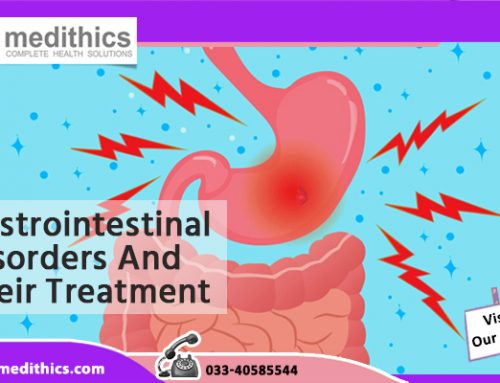Gastrointestinal Bleeding – Overview
Gastrointestinal or GI bleeding is not a disease but a symptom of underlying disorders in the digestive tract. The blood usually appears in the vomit or stool, but it is not always visible. It may, however, cause the stool to appear tarry or black. The level of bleeding can vary from being mild to severe, and it can sometimes be life-threatening.
Advanced imaging technology, when required, can identify the cause of GI bleeding. The best gastroenterologist at Medithics Clinic in Kolkata devises the right treatment plan, depending on the cause of the bleeding. Symptoms of GI Bleeding
The symptoms of gastrointestinal bleeding may or may not be evident, and they depend on where the bleed is occurring within your digestive tract. As mentioned earlier, if you have visible symptoms, you will notice black stools, rectal bleeding, or you may vomit blood. Less visible symptoms usually include other problems like dizziness, troubled breathing, or abdominal pain. If you notice changes in your bowels, you should turn to the best gastroenterology doctor in Kolkata.
Causes of GI Bleeding
Upper GI bleeding is usually caused by any of the following:
- Peptic ulcers: It is probably the most common cause of upper GI tract bleeding. Several reasons, starting from bacterial infections to taking certain medications can cause sores within the stomach and small intestinal linings.
- Tears in the oesophagus: Oesophageal tears can cause significant bleeding and usually occur in heavy drinkers. These can sometimes take place due to violent coughing or vomiting.
- Oesophagitis: It is inflammation of the oesophagus, and it is often caused by a digestive condition known as acid reflux disease or GERD. This usually causes vomiting that may look like coffee grounds.
Lower GI bleeding typically causes changes in the bowel habits of patients, says the top gastroenterologist in Kolkata. The causes of lower GI bleeding include:
- Inflammatory bowel disease or IBD: It includes both Crohn’s disease and ulcerative colitis, which typically cause inflammation, resulting in sores that develop within several parts of the digestive tract. It is often accompanied with bloody diarrhoea or bright red spots in stools. Other symptoms experienced are abdominal pain, loss of appetite, and weight loss.
- Diverticulitis: When pouch-like structures occur in the digestive tract, these are known as diverticulosis. These usually do not cause you to experience symptoms; but if the pouches become infected, it may result in diverticulitis, producing significant amount of blood in your faeces.
- Colon polyps: It is the lump that forms on the large bowel and generally will not cause symptoms. Some people may notice mucus in the stool or abdominal pain. Rectal bleeding is a symptom sometimes experienced by individuals with colon polyps.
If you see any of the visible warning signs, then it is time to visit the best gastroenterologist in Kolkata as soon as possible.






Leave A Comment
You must be logged in to post a comment.